Best rugged hard drives and SSDs: Keep your data safe with these drop-proof drives
Need a durable SSD or HDD for on-the-go storage? We put the through our submersion, shock, and drop tests to find the most durable drives you can buy
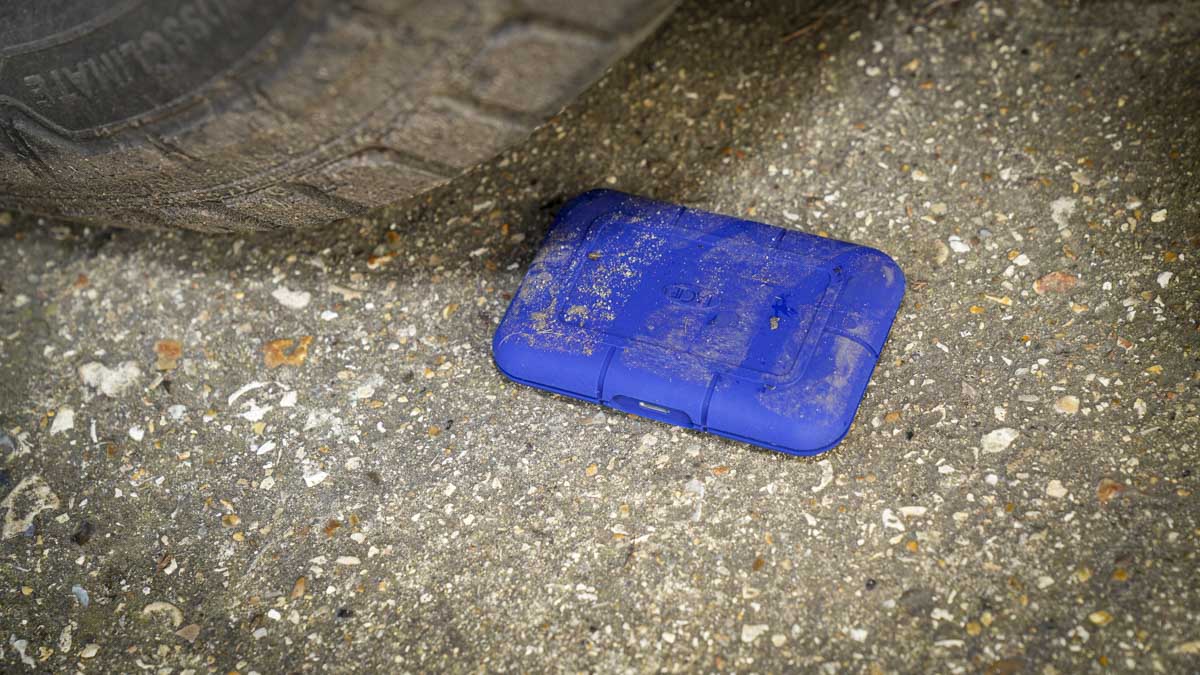
Sign up for breaking news, reviews, opinion, top tech deals, and more.
You are now subscribed
Your newsletter sign-up was successful
After subjecting the best rugged hard drives and rugged SSDs to a series of submersion, shock, and drop tests, we've picked out the most durable storage drives - whether you're looking for one with a little extra protection, or a drive that'll cope with the most extreme conditions.
For most people, the Adata SD810 is a superb choice. It's incredibly compact, comes in a range of capacities, and with a low price tag that makes it suitable for every budget. Transfer speeds are ultra-fast thanks to the USB 3.2 Gen 2x2 interface. And, most importantly, it's fully IP68 certified, making it dust- and water-proof. This rugged SSD performed exceptionally well in our tests, taking a real battering without hindering performance at all.
But it's not the only option out there, and our testing panel has compared size, storage capacity, assessed durability, and benchmarked transfer speeds to find the rugged HDD and SSD that will capably handle harsher conditions than any office desktop drive can withstand.
And for more ruggedized devices, we've also thoroughly tested the best rugged laptops, best rugged phones, and best rugged tablets.
Best rugged SSD overall
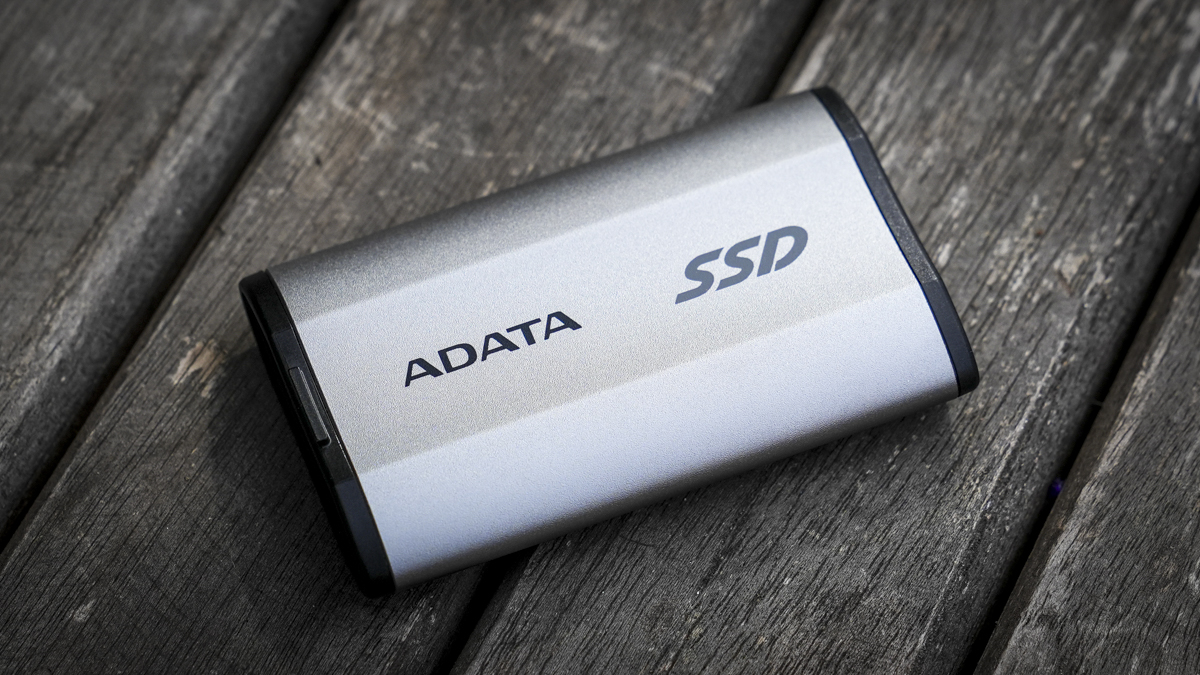
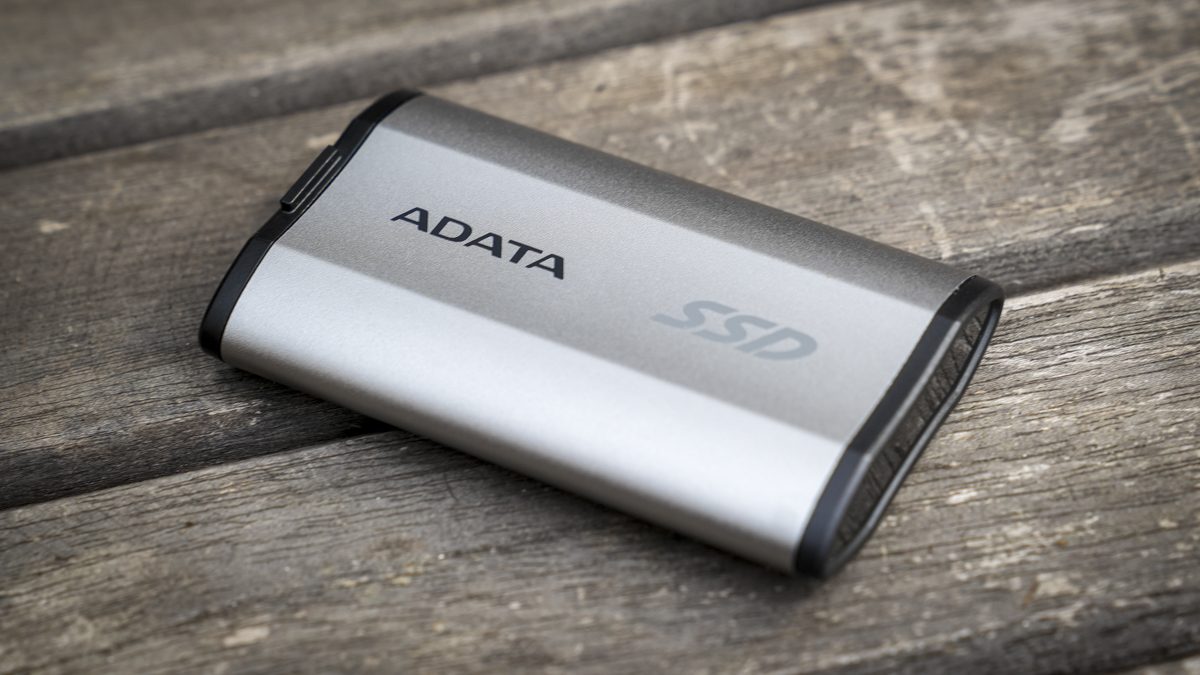
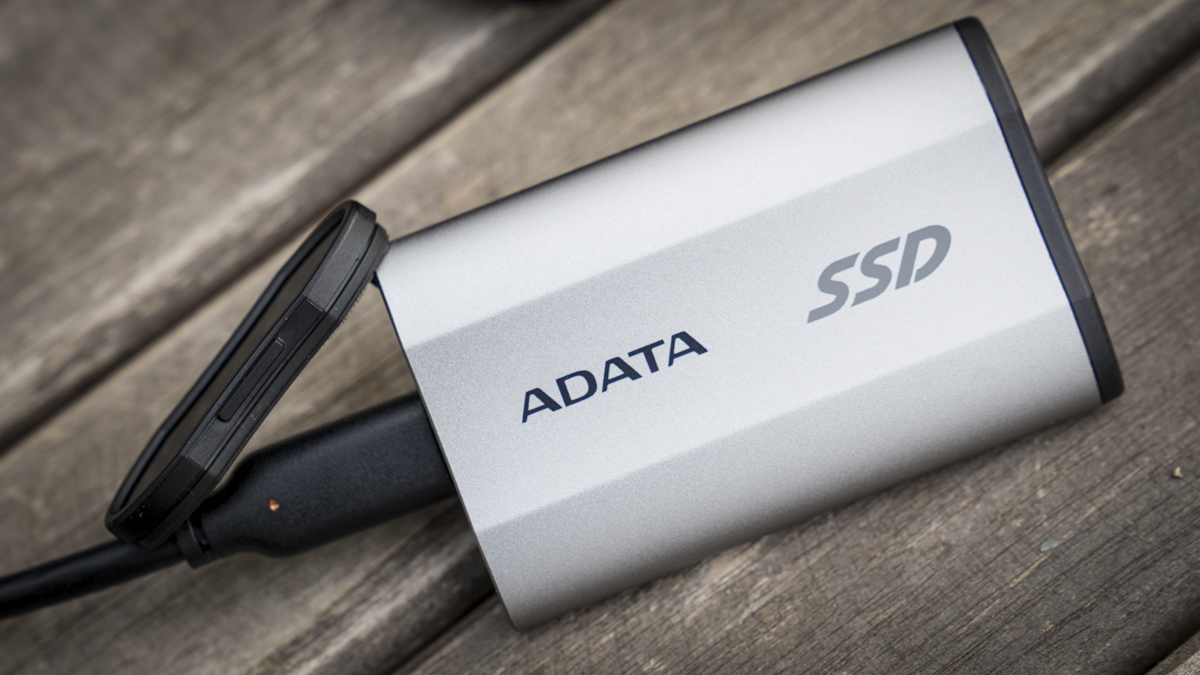
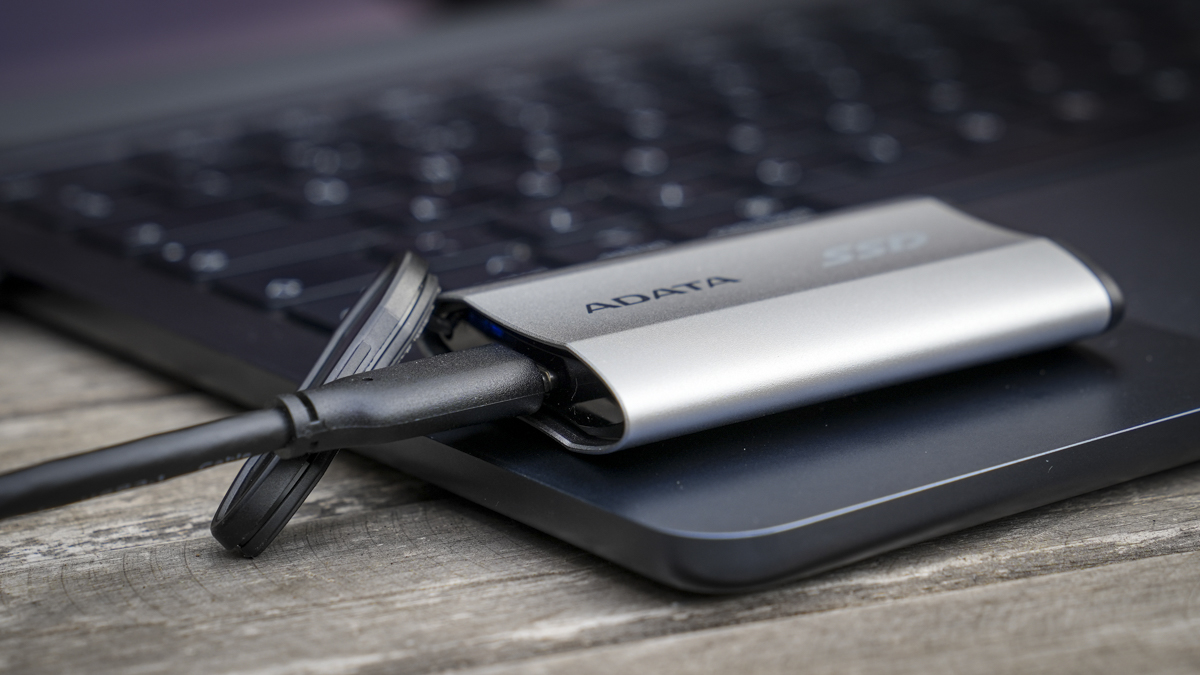
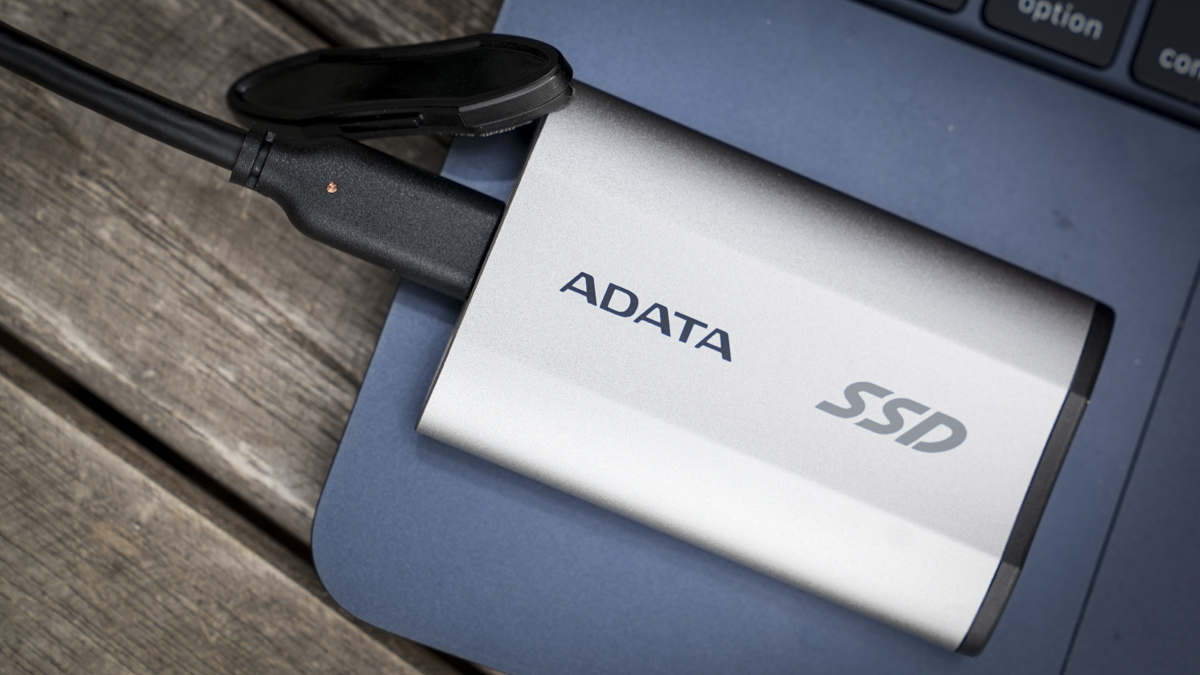

Specifications
Reasons to buy
Reasons to avoid
Compact, lightweight, cheap, and with a rugged IP68 rating, the Adata SD810 impressed us during our tests. Alongside IP68, this SSD features MIL-STD-810G 516.6 impact resistance, too. We submerged it in water, dropped it from a height of 1.22m, and left it kicking about at the bottom of a kit bag for days. After all that, it still worked perfectly.
The drive is capable of speeds of up to 2000MB/s, which makes it ideal for anyone handling large media files. However, you're going to need a device that supports USB 3.2 Gen 2x2, which is essential for hitting those max speeds. Since Apple laptops and computers don't have that support at all, the maximum speed is going to be cut in half, down to 1000MB/s. In that case, opt for a USB4 or Thunderbolt 5 rugged drive instead.
We've also tested the Adata SD820 (read our review here). This moderare upgrade is effectively the same, with near-identical specs, although availability isn't as good as the SD810 yet. Either is a superb all-rounder pick that's fast, generous with its capacities, and fully dust- and water-proof.
Read our full Adata SD810 review
Best rugged hard drive on a budget
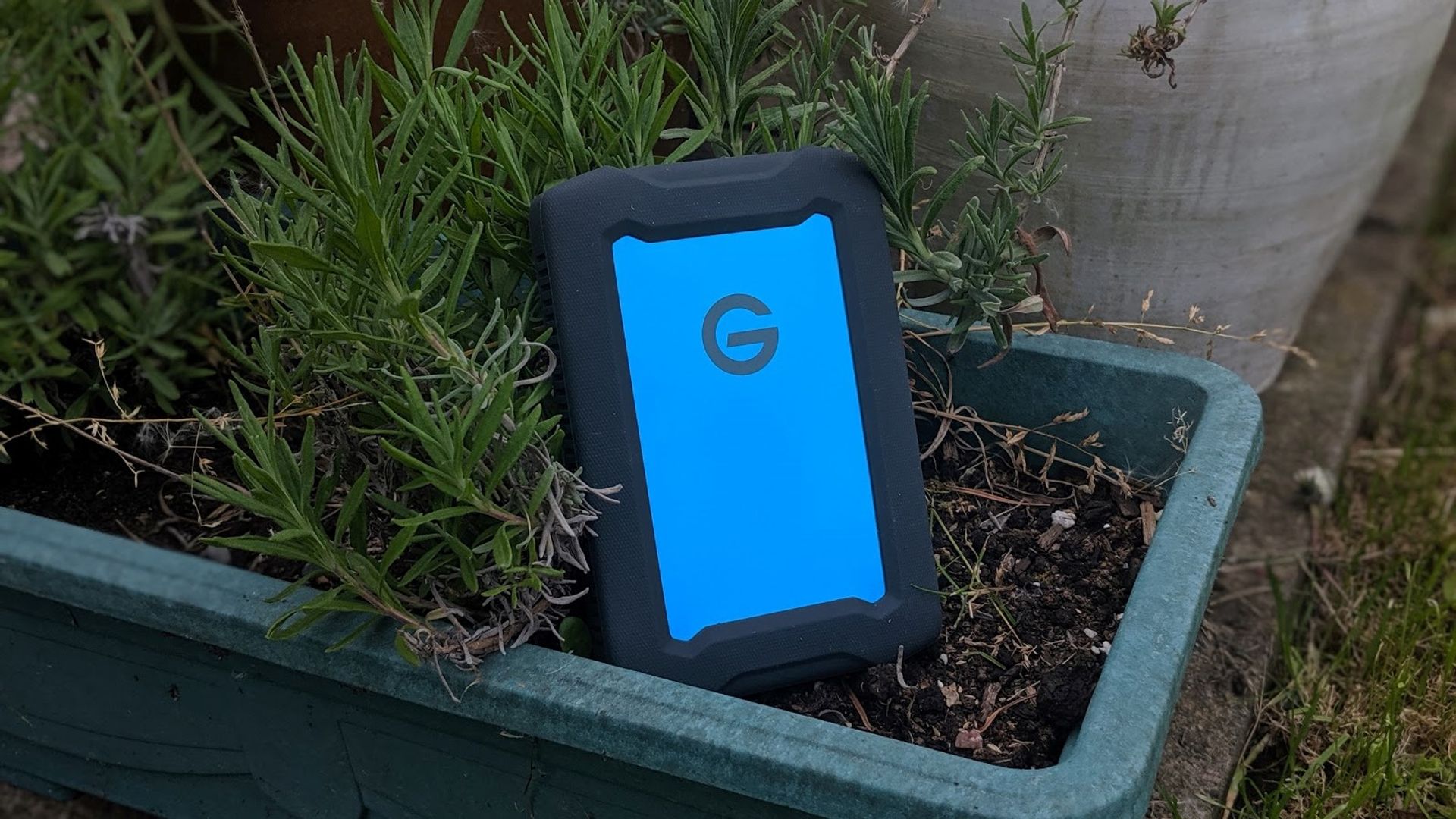
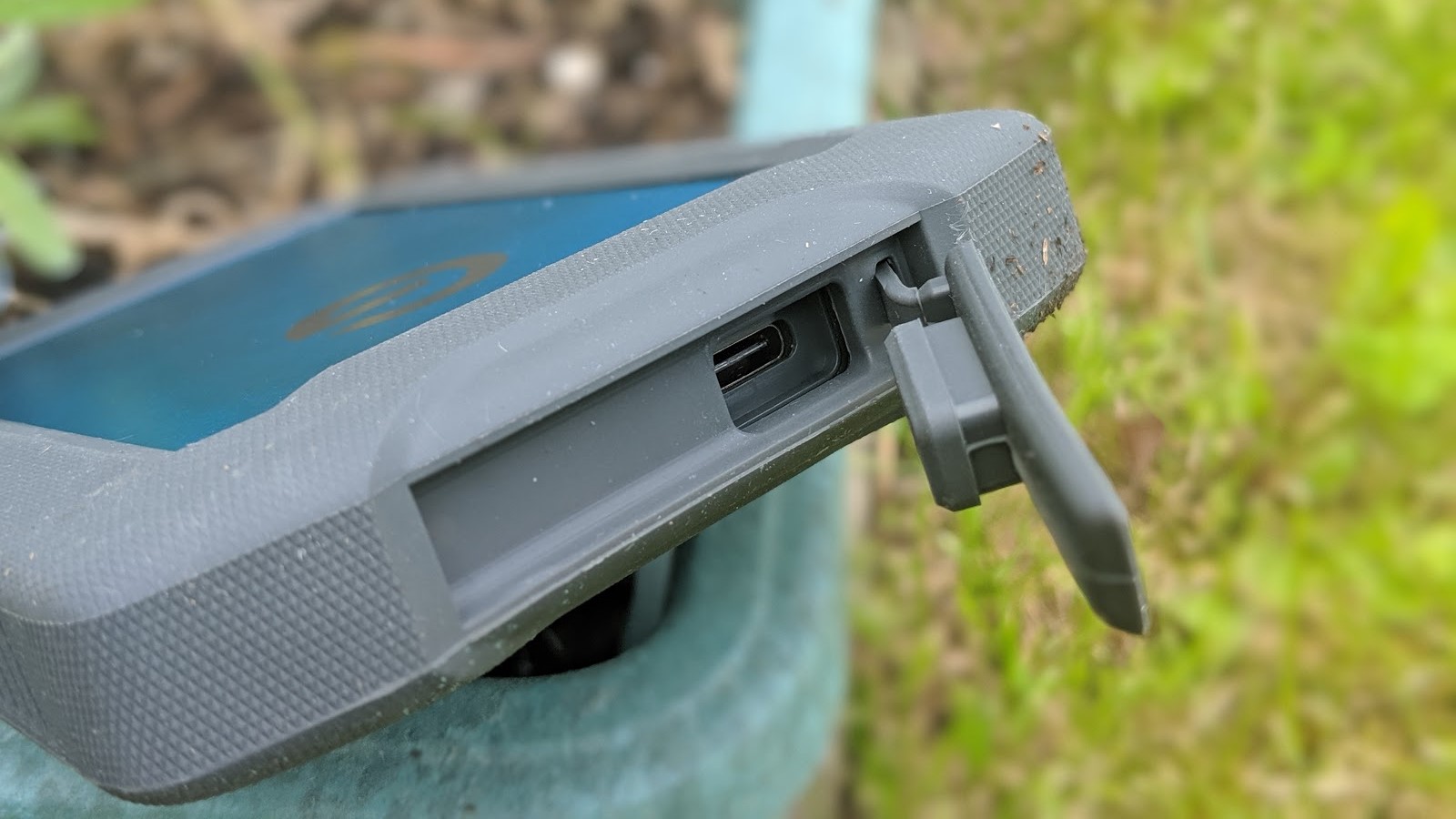
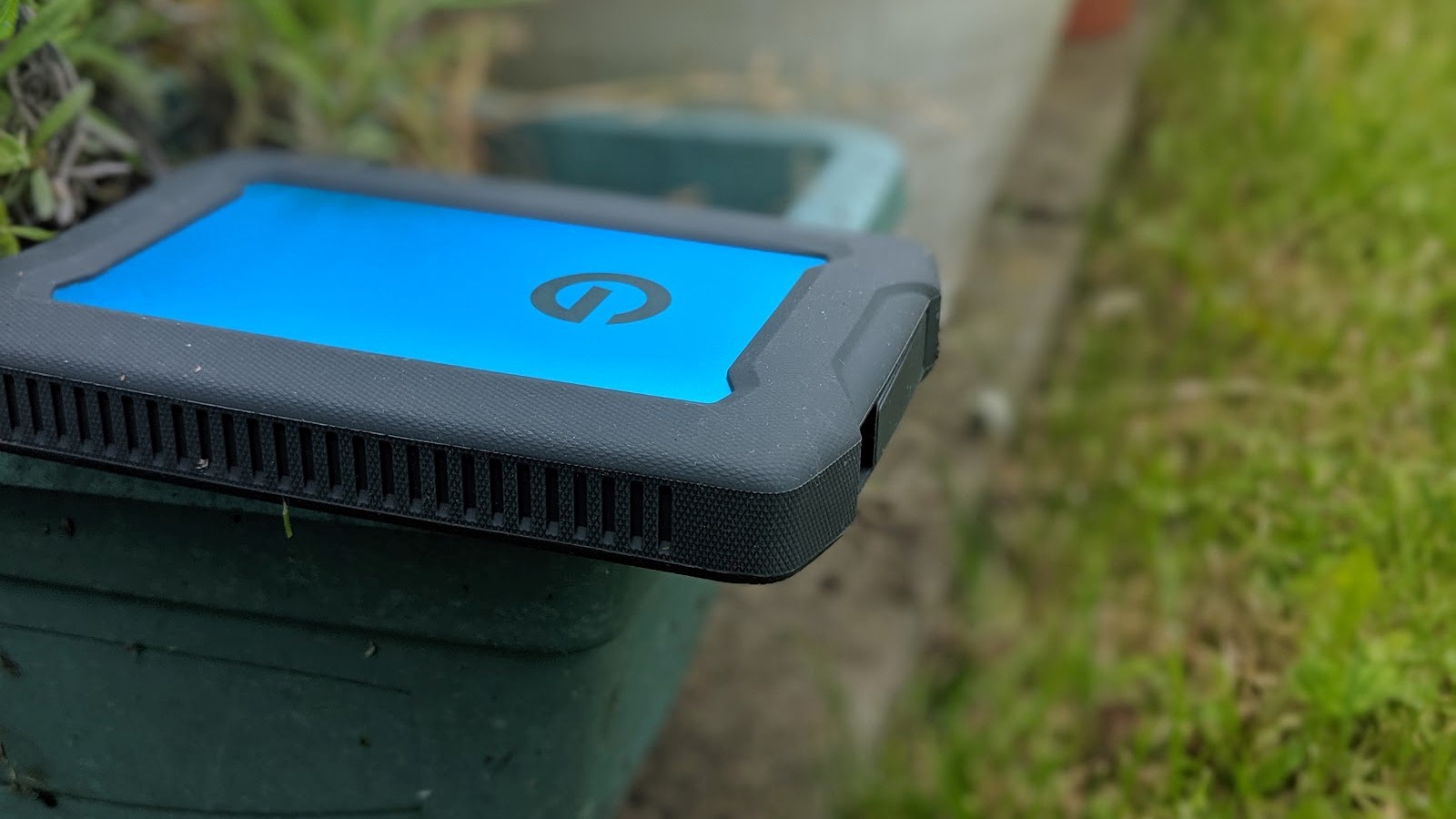
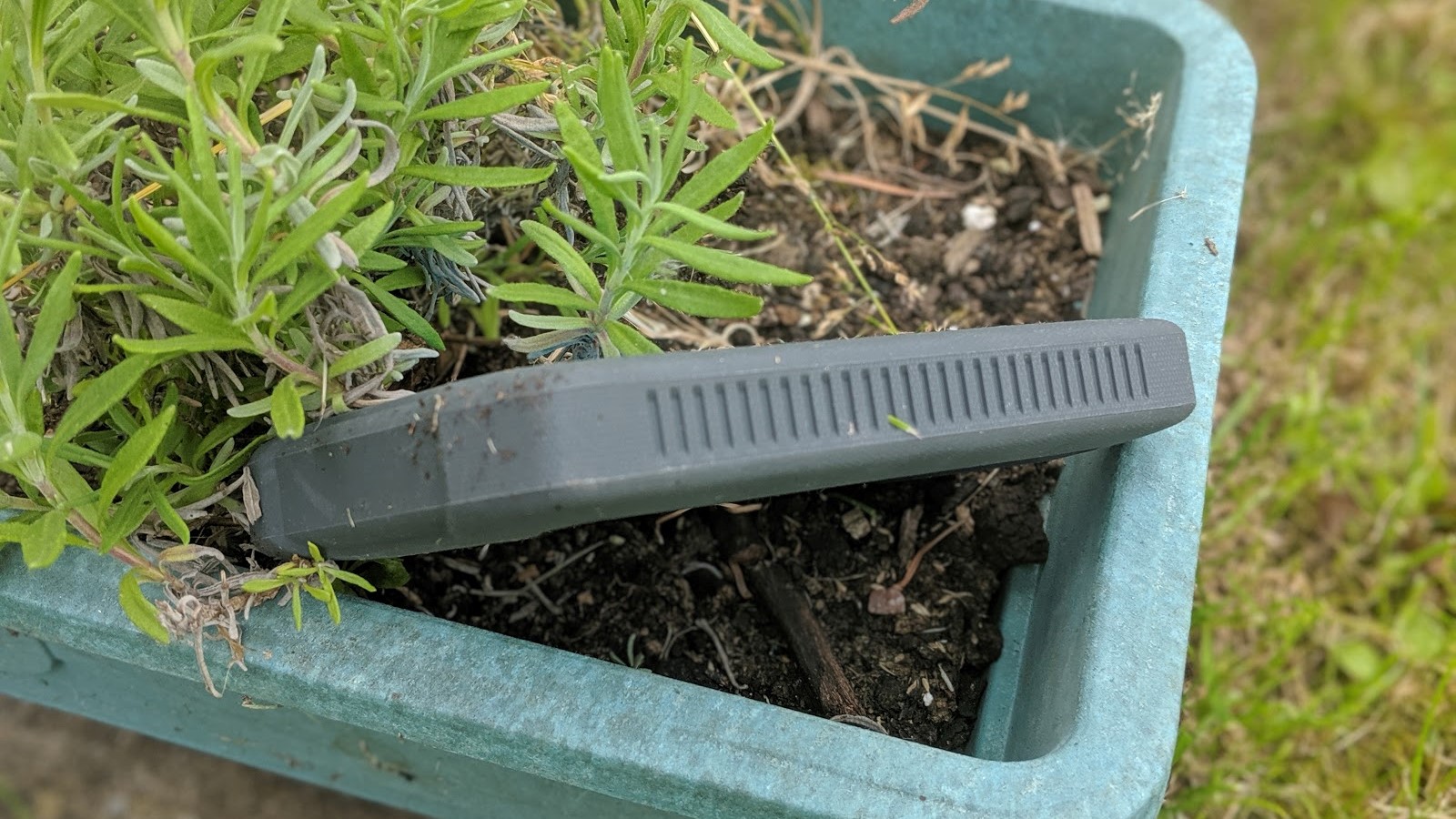
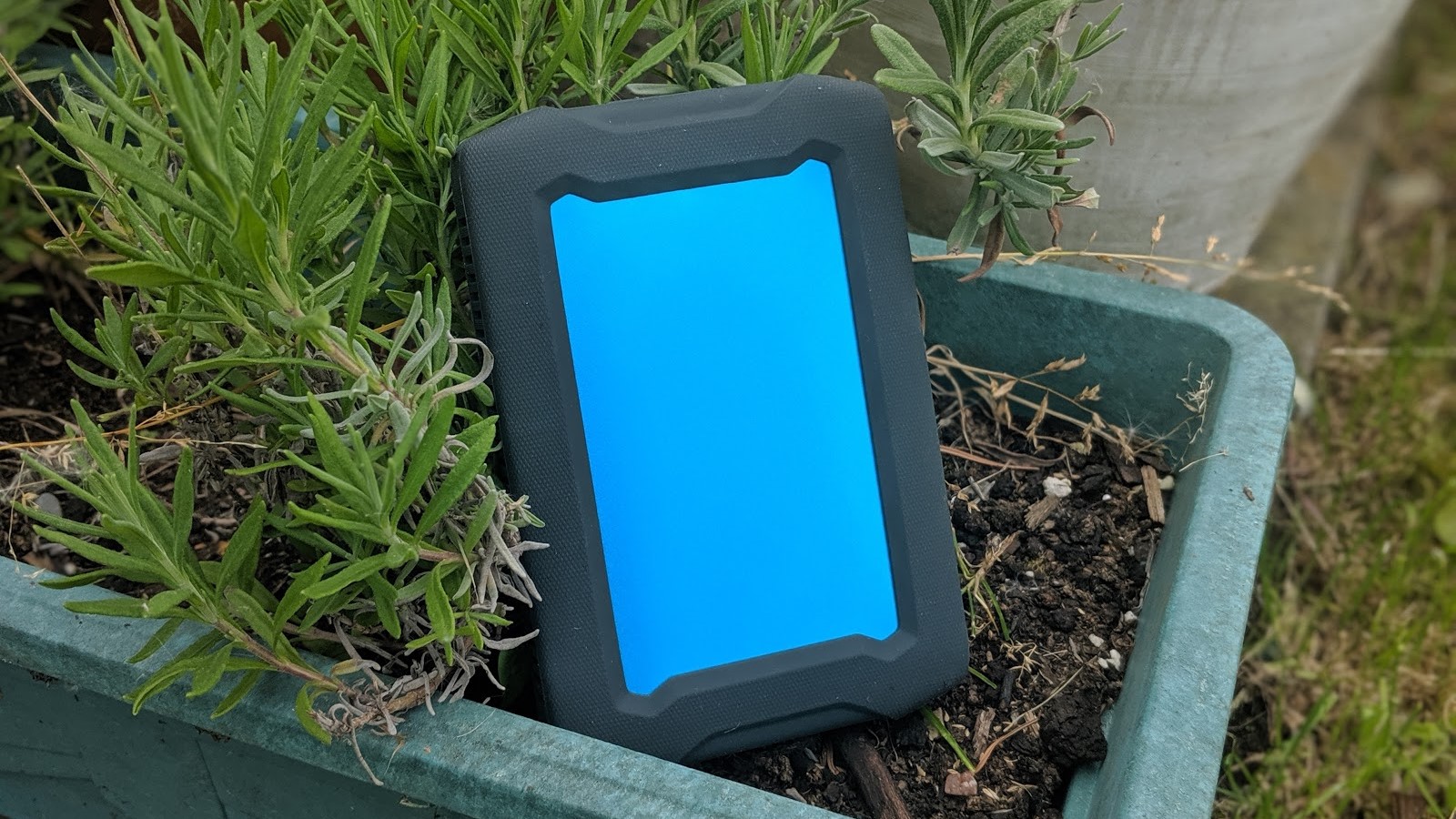
Specifications
Reasons to buy
Reasons to avoid
If you want a budget rugged drive, HDD is probably the way to go for one simple reason: high-capacity SSDs are going to cost a lot more than hard drives do. The SanDisk Professional G-DRIVE ArmorATD is a prime example of that.
Now, it's not as rugged the solid-state drives we've selected - with its moving internal mechanisms, no hard drive is. Nor is it going to set any speed records, hitting read/write speeds of 140MB/s and 130MB/s respectively in our tests. But it has an IP54 rating, 1000lb crush resistance, and a rubberized bumper for better protection and grip.
Really, though, what seals the deal is the fact that it boasts up to 6TB storage capacity, with an attractive price-tag.
Read our full SanDisk Professional G-DRIVE ArmorATD HDD review
Best rugged SSD for professionals
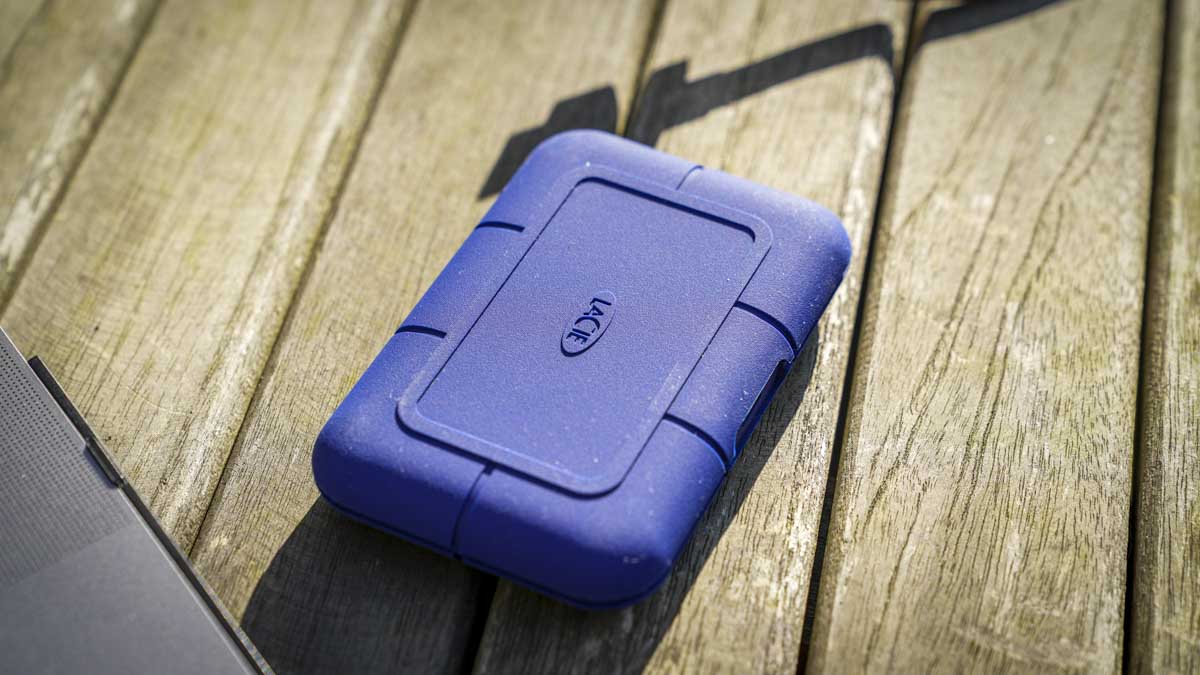
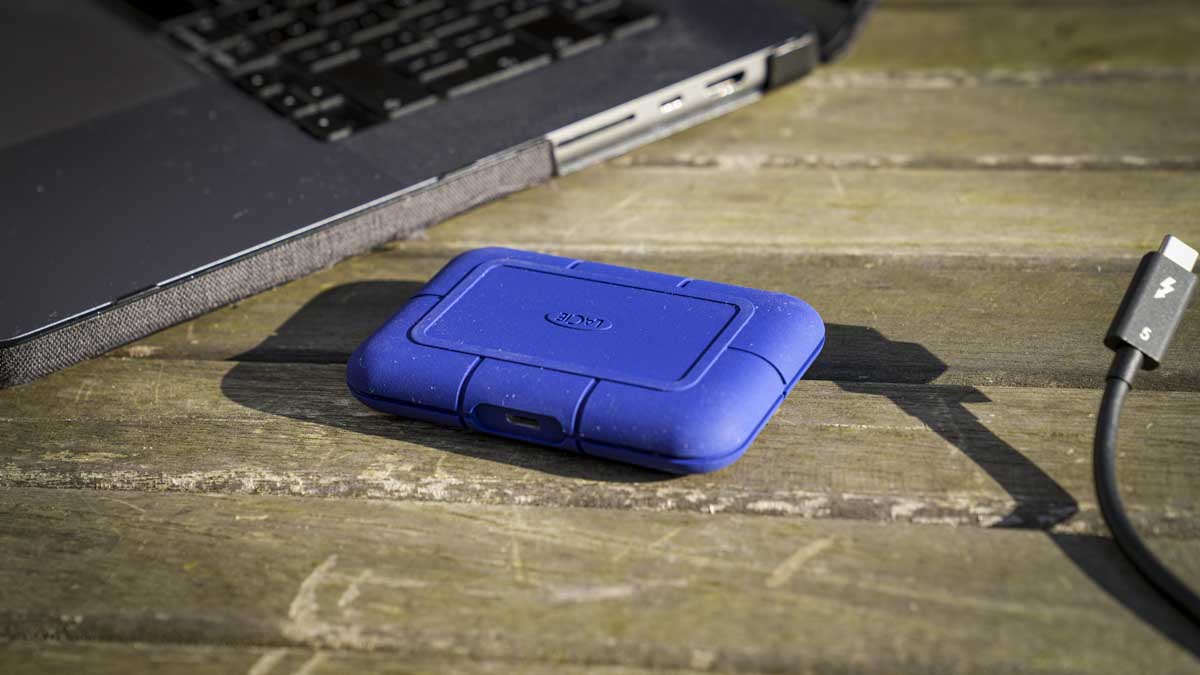
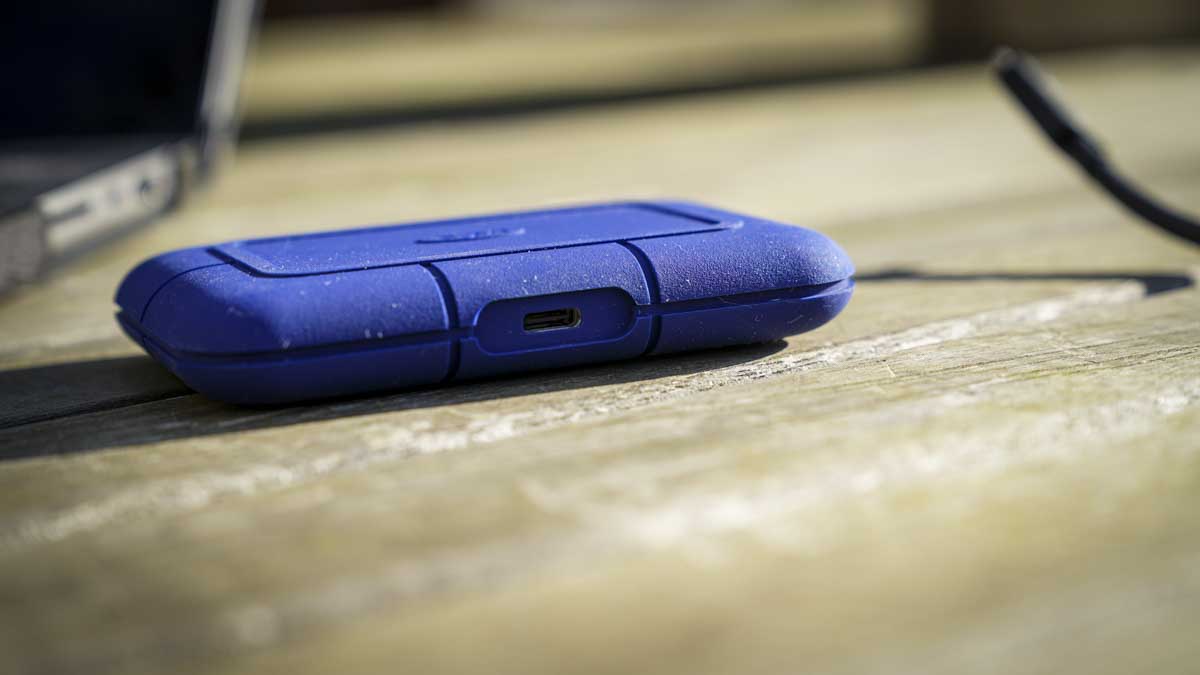
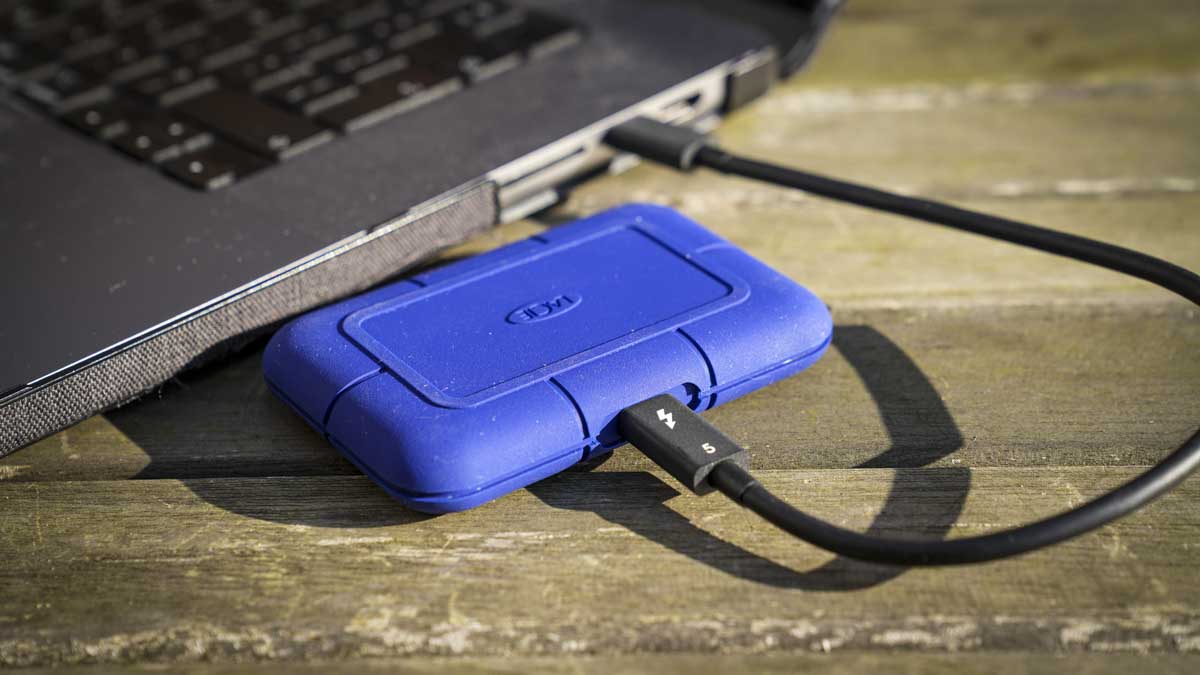

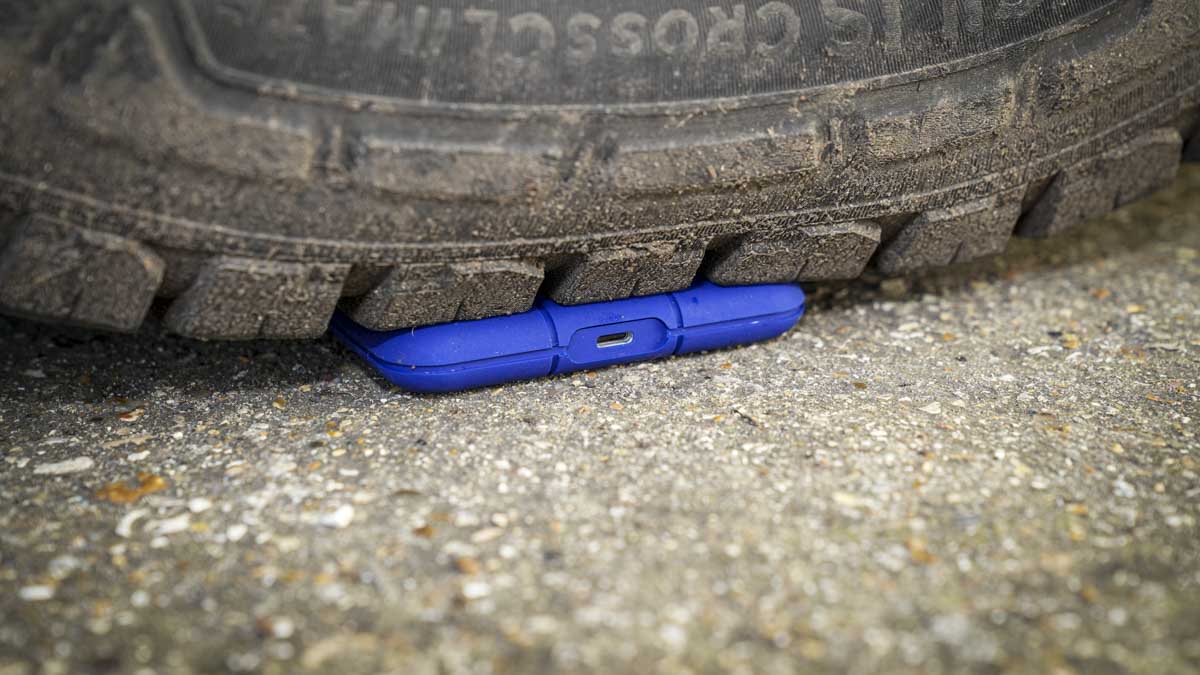
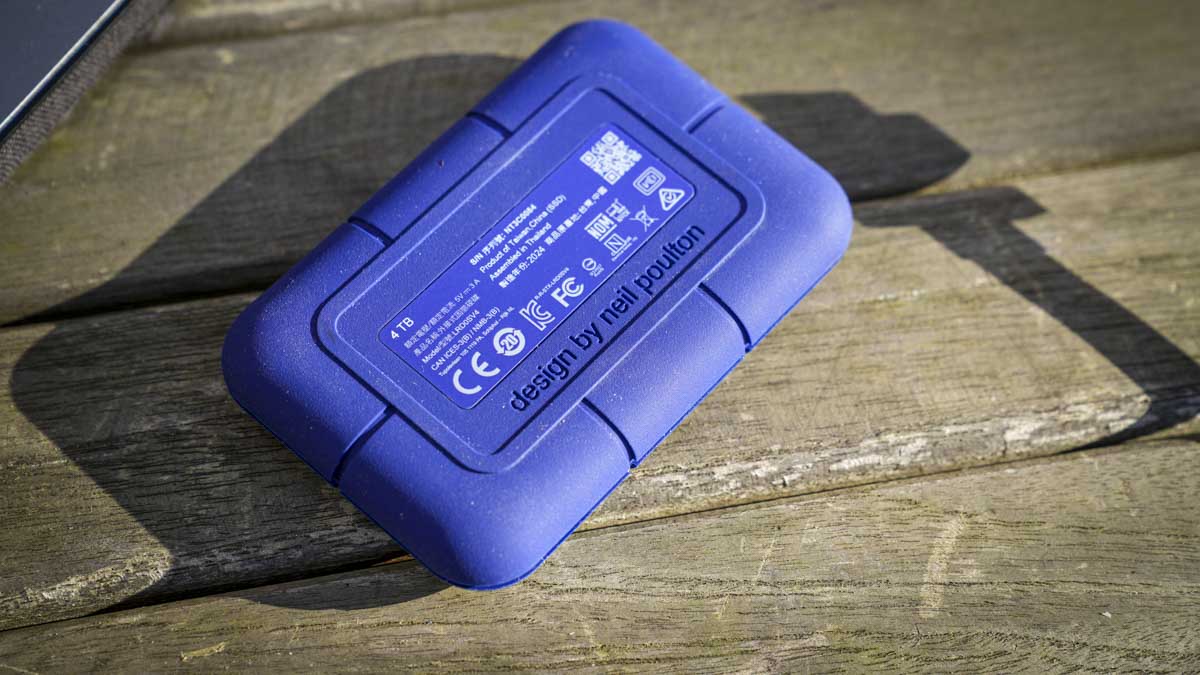
Specifications
Reasons to buy
Reasons to avoid
This rugged SSD took a serious beating during our tests - and it still came out on top. Not even getting crushed under the wheel of a car could stop it. It's an exceptional rugged SSD for professionals - whether that's working on a jobsite or in extreme conditions, or photographers and videographers working on the go.
The LaCie Rugged Pro5 is IP68 rated, meaning it's protected against water and dust ingress, and supports Thunderbolt 5, which makes it extremely fast when it comes to file transfers. In our tests, we clocked read speeds of 6,700 MB/s and a 5,300 MB/s write speed.
Design-wise, it's well-constructed, well-made, and even includes Velcro for adhering to the back of a monitor for safe-keeping. That's ideal for those constantly on the move, like photographers and videographers, and more. Besides that, it's small in size and we found it can be comfortably transported.
In fact, our only real complaint is that, with the rubberized skin, there's no easy way of applying labels. So, if you're using more than one, it can get confusing as to which drive holds specific files. We would've also liked to see a plug to protect the USB port.
Overall, though, it's extremely well-suited for anyone that need quick transfer speeds and a device that's very well-protected against the elements.
Read our full LaCie Rugged Pro5 review
Best rugged SSD with USB4
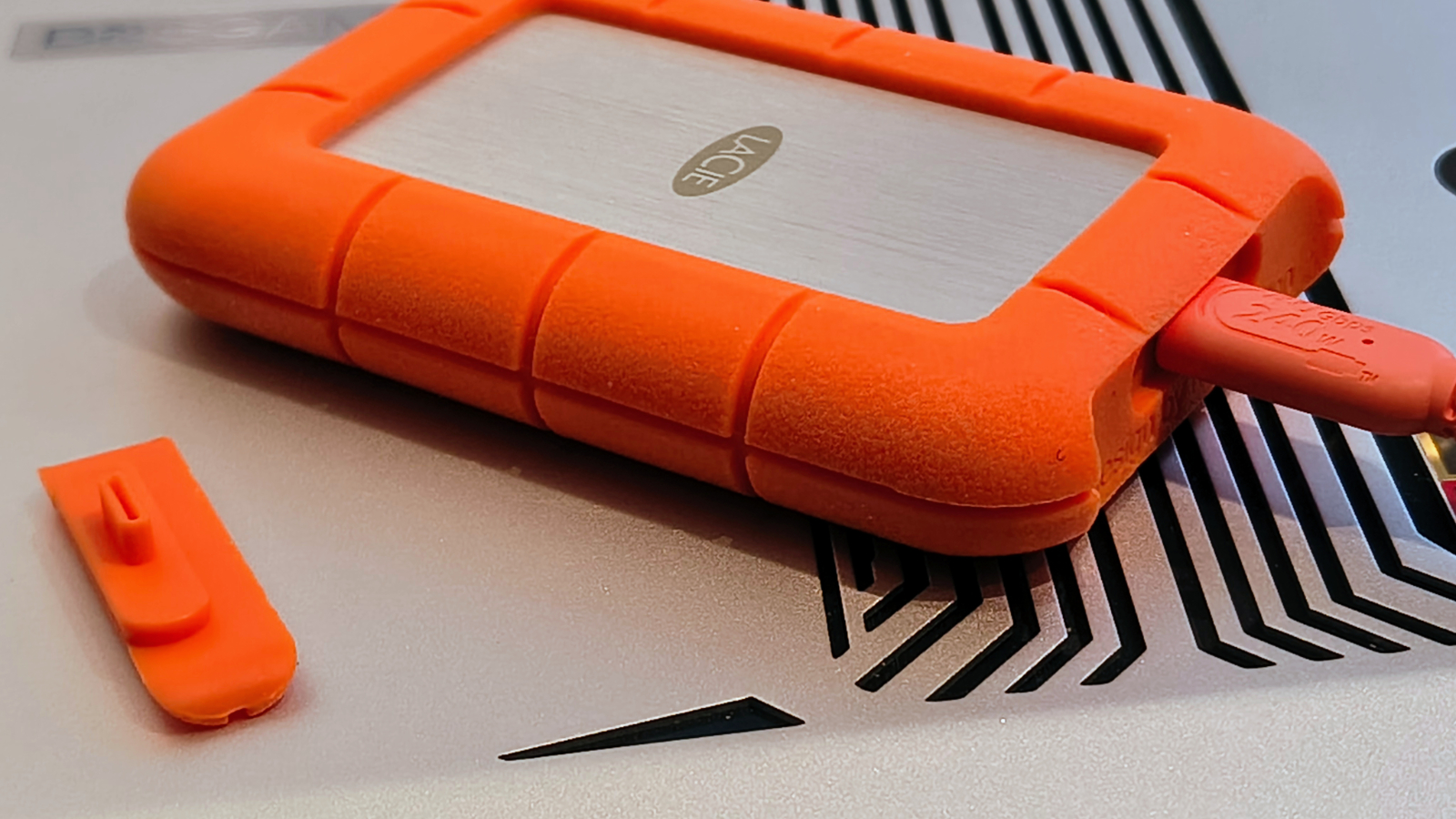

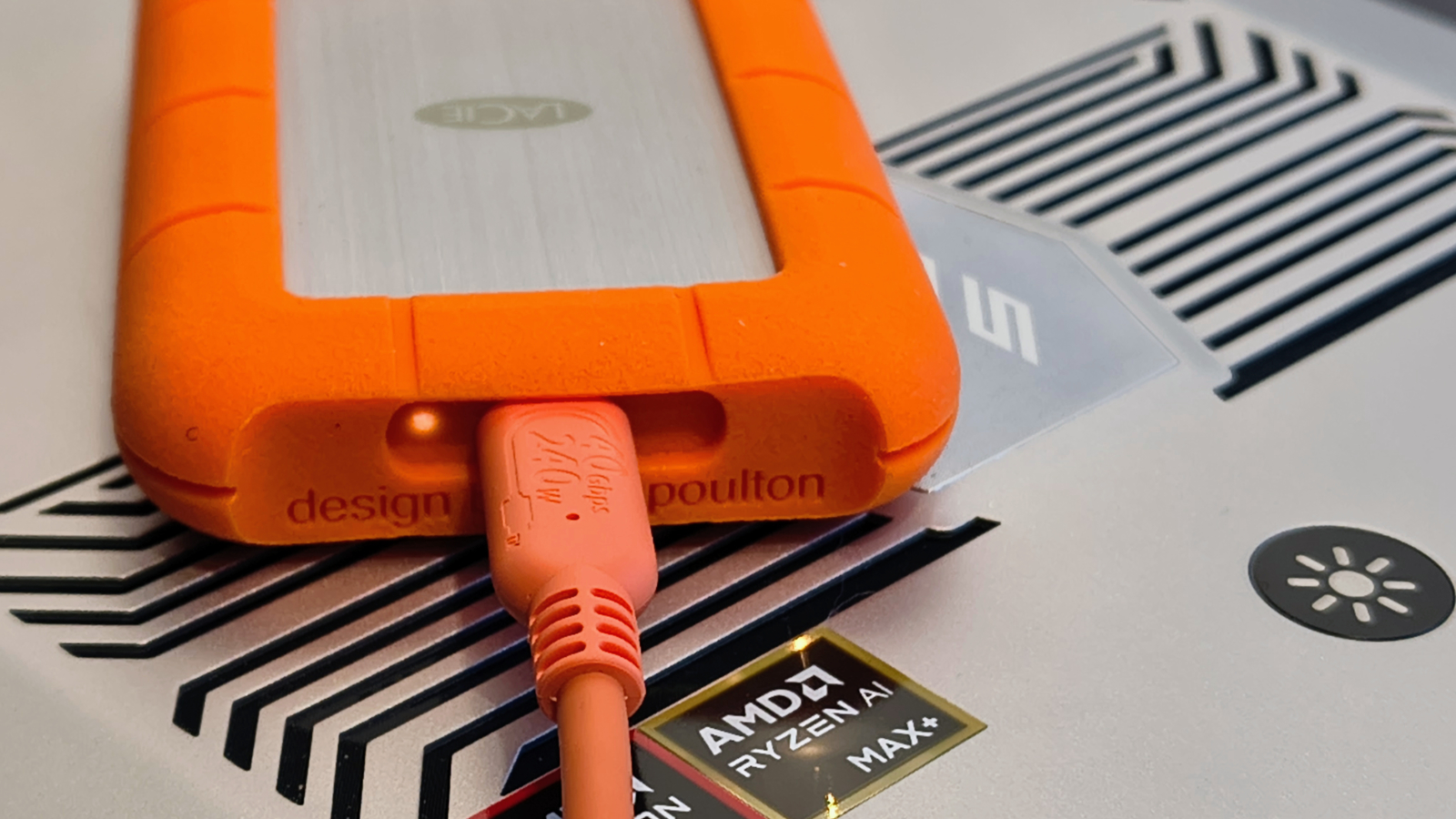
Specifications
Reasons to buy
Reasons to avoid
There's often a balancing act when it comes to speed and durability - the LaCie Rugged SSD4 is an excellent example of that.
Thanks to the USB4 connectivity, it's capable of hitting up to 4000 MB/s if you have a device that supports it.
In our simulated benchmarks, it reached read speeds of 4058 MB/s and write speeds of 3741 MB/s. However, in real-world testing, we could only hit 2034MB/s and 2542 MB/s - although we suspect that's due to the machine we were using downgrading the USB4 port.
But the trade-off here is that it's only IP54. So, while it'll capably withstand dust and, say, being splashed with rainwater, it's not fully waterproof.
Still, if you don't need the most durable SSD in the world, the Rugged SSD4 is an excellent example. It features LaCie's iconic orange rubber bumper, and will withstand shocks and drops. Where the design falls down - and it's true of several LaCie drives - is the rubber port covering is completely detachable, so be careful not to lose it.
Read our full LaCie Rugged SSD4 review
Best rugged SSD for mobile devices
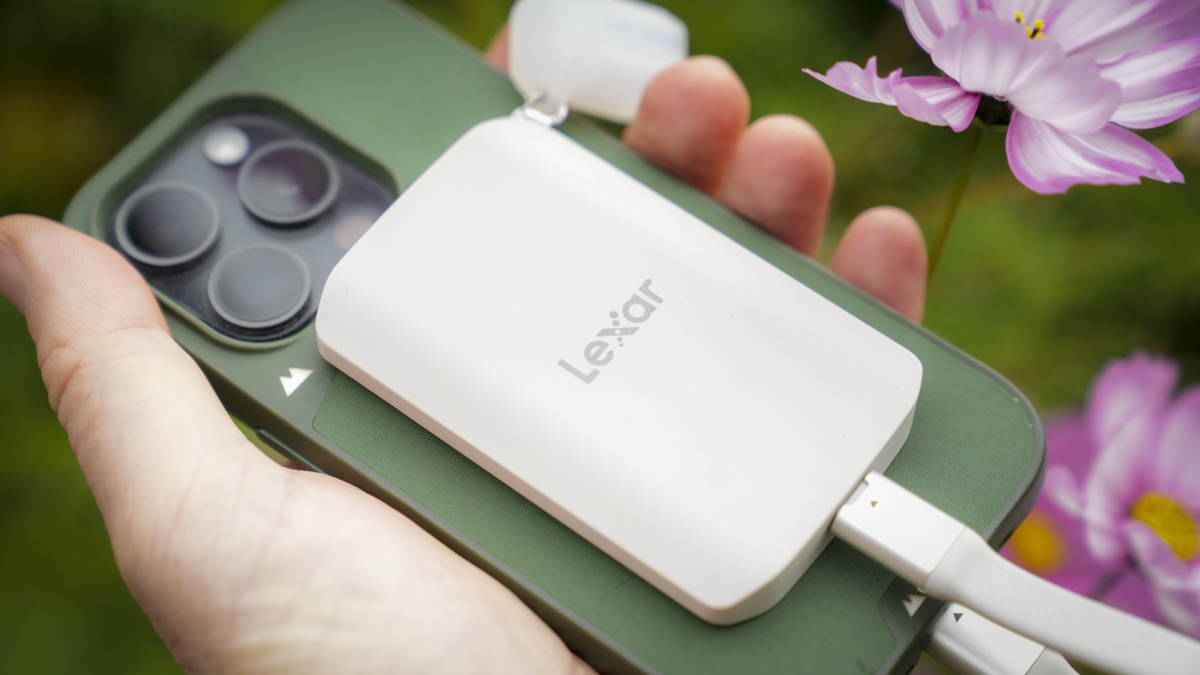
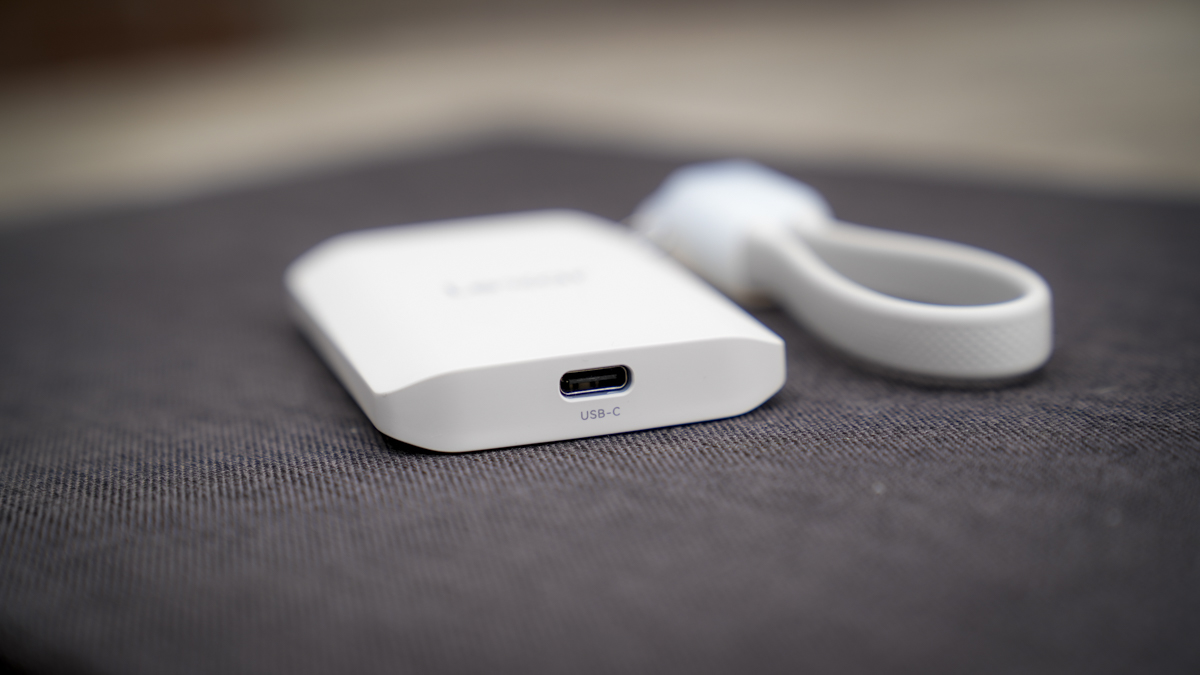
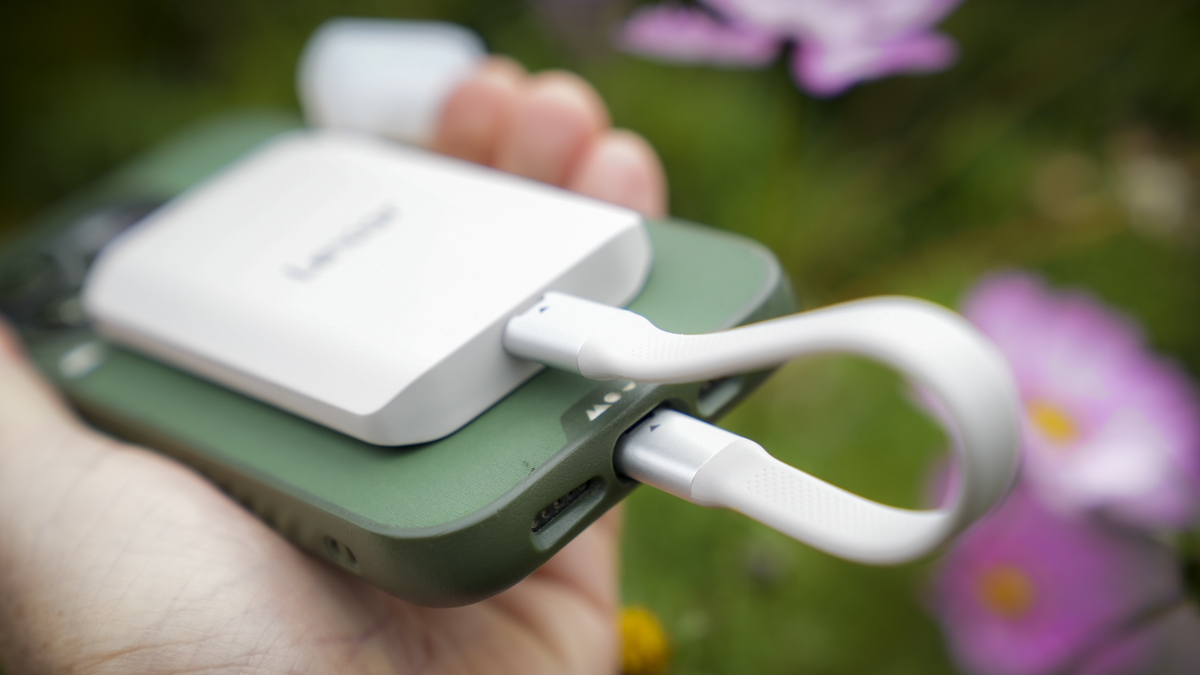
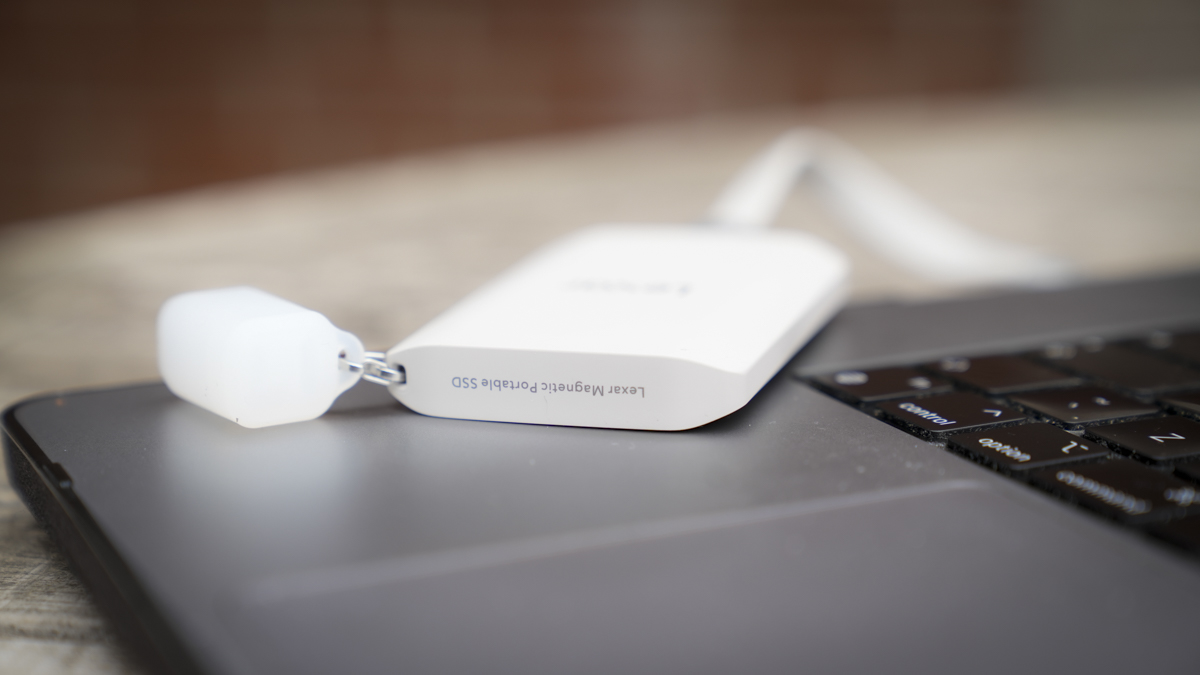
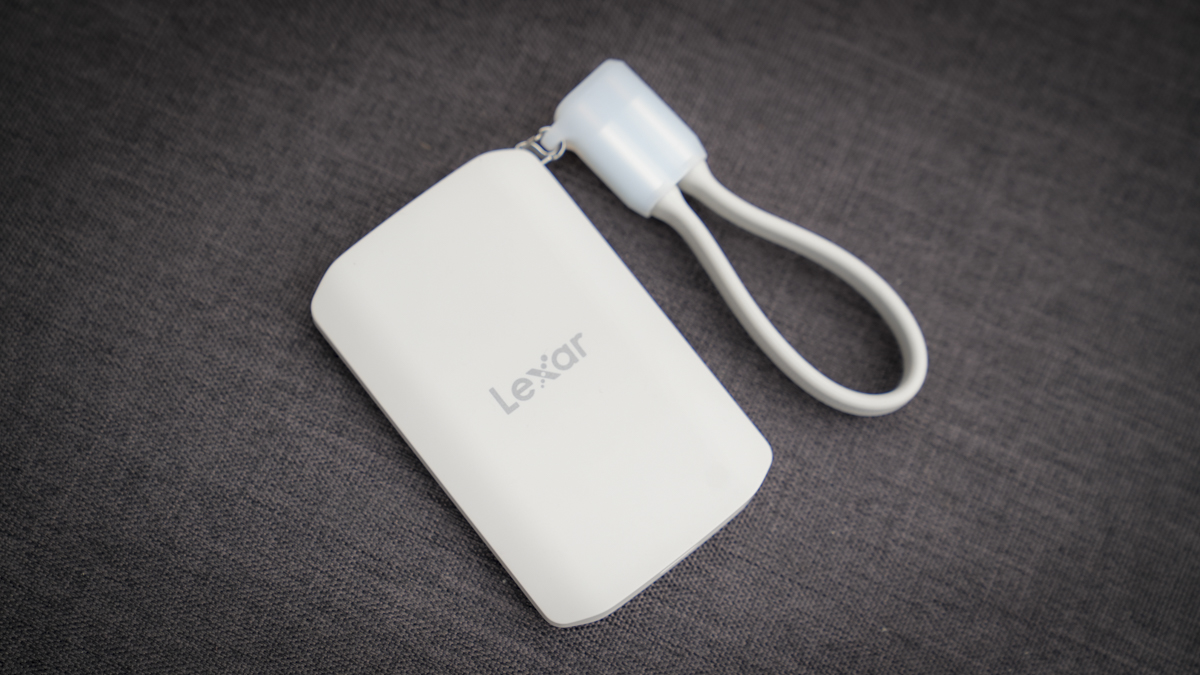
Specifications
Reasons to buy
Reasons to avoid
The Lexar ES5 might not look like much, but it's got it where it counts. This compact SSD has a rugged rating of IP54, giving it some dust and water resistance. Sure, we would've preferred it to be even more rugged - fully water-proof would be nice - but in our tests it had no problems being subjected to moderate elements when used on the go.
It's magnetic, so if you're running an iPhone, it'll sit securely to the back of your phone. But with its Type-C connectivity, it'll hook up to any USB-C compatible phone. The longer cable also means it was easy to connect to our laptops and MacBooks too.
As you'd expect from a rugged drive boasting the USB 3.2 Gen 2x2 interface, speeds are ultra-fast on supported devices. During the benchmark tests, it delivered more or less the stated 2000MB/s transfer speeds (using CrystalDiskMark, read speeds hit 2045.36MB/s, write speeds reached 1996.87 MB/s).
The design isn't quite as refined as we'd like, but for quick portable storage, it ticks all the boxes.
Read our full Lexar ES5 review
Best rugged SSD and hard drive: FAQs
What is a rugged hard drive?
Rugged hard drives are like regular portable or external hard drives except that they are far more resistant to damage that would otherwise take a normal portable storage device out of commission. These devices are meant for extreme terrain and conditions, like construction sites, remote science outposts, and for military and paramilitary use. While you could use a rugged hard drive like a regular consumer device, rugged devices are usually more expensive owing to their many layers of extra protection and testing requirements.
What do the IP ratings for rugged drives mean?
When looking at rugged SSD and hard drives, you're going to see the IP certification - and this determines what sort of treatment is can withstand.
The first digit tells you how well-protected it is to dust; the second digit lets you know the water protection.
Below, we've listed some common IP ratings you'll find on durable HDD and SSD devices - and what protection you'll gain from them.
IP rating | Dust/sand protection | Water protection |
|---|---|---|
IP54 | Protected against dust that may enter the drive | Splash-proof |
IP55 | Protected against dust that may enter the drive | Spill-proof |
IP65 | Sealed from dust ingress | Spill-proof |
IP67 | Sealed from dust ingress | Water-proof up to 1 meter for 30 minutes |
IP68 | Sealed from dust ingress | Water-proof over 1 meter for over 30 minutes |
How to choose the best rugged hard drives for you
Although it may seem daunting trying to pick the best rugged hard drive from such a vast selection, there are three simple ways to narrow down the field.
Firstly, begin with budget. After all, if you've a set cost in mind you're not willing to spend a penny over, there's little point looking too deeply at devices that cost three times as much.
Once this has whittled down your choice, decide just how much storage you're going to require. If you're, for example, a full-time photographer or filmaker who regularly needs terrabytes of storage to backup your work on while out in the field, you'll need to look at the options that provide at least 1TB or 2TB of storage, possibly more.
Lastly, consider how and where you'll typically be using your hard drive. Presumably you're on the hunt for a robust and rugged version because you're either constantly on the move, working in the outdoors, or are just particularly clumsy. But does it need to be dust-resistant? Will it regularly be exposed to water? Consider these factors before making your choice on the best fit for you.
How we test the best rugged hard drives
In order to make our selection of best rugged hard drives we took several key factors into consideration. Cost was chief among them, or rather, value, as we judged which hard drives offer the most for their price.
As well as looking at each device's specs - such as storage capacity, portability, ease-of-use, connectivity options, and platform compatibility - we wanted to properly test the main selling point of each hard drive: its ruggedness. After all, if you're on this page, you're hunting for something that's going to last, even when severely tested.
And so we road-tested just how tough these hard drives are, analysing water and dust resistance, shock and drop proofing, and whether they boasted standardised certifications (such as IP68).
Get in touch
- Want to find out about commercial or marketing opportunities? Click here
- Out of date info, errors, complaints or broken links? Give us a nudge
- Got a suggestion for a product or service provider? Message us directly
- You've reached the end of the page. Jump back up to the top ^
Today's best rugged SSD & HDD deals
Sign up to the TechRadar Pro newsletter to get all the top news, opinion, features and guidance your business needs to succeed!

Steve is B2B Editor for Creative & Hardware at TechRadar Pro, helping business professionals equip their workspace with the right tools. He tests and reviews the software, hardware, and office furniture that modern workspaces depend on, cutting through the hype to zero in on the real-world performance you won't find on a spec sheet. He is a relentless champion of the Oxford comma.